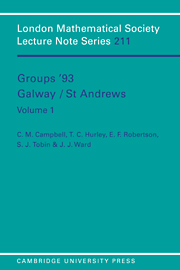Book contents
- Frontmatter
- Contents
- Preface
- Introduction
- Geometry, Steinberg representations and complexity
- The structure of metabelian finite groups
- Table algebras of extended Gagola-type and applications to finite group theory
- On the saturation of formations of finite groups
- Locally constructed formations of finite groups
- Reflections on virtually one-relator groups
- Rickard equivalences and block theory
- Computing the conjugacy classes of elements of a finite group
- Quotient categories of modules over group algebras
- Weak chain conditions for non-almost normal subgroups
- Computation of the character table of affine groups using Fischer matrices
- The lattice of compact representations of an infinite group
- Automorphisms of nilpotent and related groups
- Generation of orthogonal groups over finite fields
- The structure of certain Coxeter groups
- n-free groups and questions about universally free groups
- Classification of all generating pairs of two generator Fuchsian groups
- Parametric words and models of the elementary theory of non-abelian free groups
- The groups G(n, l) as fundamental groups of Seifert fibered homology spheres
- Lifting automorphisms: a survey
- (MI)-groups acting uniserially on a normal subgroup
- Revisiting a theorem of Higman
- Cohomological finiteness conditions
Locally constructed formations of finite groups
Published online by Cambridge University Press: 02 March 2010
- Frontmatter
- Contents
- Preface
- Introduction
- Geometry, Steinberg representations and complexity
- The structure of metabelian finite groups
- Table algebras of extended Gagola-type and applications to finite group theory
- On the saturation of formations of finite groups
- Locally constructed formations of finite groups
- Reflections on virtually one-relator groups
- Rickard equivalences and block theory
- Computing the conjugacy classes of elements of a finite group
- Quotient categories of modules over group algebras
- Weak chain conditions for non-almost normal subgroups
- Computation of the character table of affine groups using Fischer matrices
- The lattice of compact representations of an infinite group
- Automorphisms of nilpotent and related groups
- Generation of orthogonal groups over finite fields
- The structure of certain Coxeter groups
- n-free groups and questions about universally free groups
- Classification of all generating pairs of two generator Fuchsian groups
- Parametric words and models of the elementary theory of non-abelian free groups
- The groups G(n, l) as fundamental groups of Seifert fibered homology spheres
- Lifting automorphisms: a survey
- (MI)-groups acting uniserially on a normal subgroup
- Revisiting a theorem of Higman
- Cohomological finiteness conditions
Summary
All groups considered in this paper are finite.
The origin and further development of Class Theory has as a corner-stone the concepts of saturated formation and covering subgroup. These were first introduced by Gaschütz in 1963 in his paper Zur Theorie der endlichen auflösbaren Gruppen with the aim of building a general context in which the properties of existence and conjugacy of Sylow subgroups, Hall subgroups and Carter subgroups could appear as particular cases. Thus, working in a universe V of groups which is closed with respect to the usual closure operators, a formation is a class of groups F contained in V with the following properties:
Every homomorphic image of an F-group is an F-group.
If G/M and G/N are F-groups, then G/(M ∩ N) is also an F-group.
The formation F is said to be saturated if the group G belongs to F whenever the Frattini factor group G/Φ(G) is in F.
For a given group G ∈ V and a class of groups F, an F-covering subgroup of G is a subgroup C of G belonging to F and such that whenever C ≤ H ≤ G, K ⊴ H and H/K ∈ F, then H = CK. So C covers each F-quotient of every intermediate group of G. When V is the universe of finite soluble groups and F is a saturated formation of soluble groups, Gaschütz proved that every group G ∈ V has a unique non-empty conjugacy class of F-covering subgroups. Also it was shown by him that when F is the class of Sp, Sπ or N, then the F-covering subgroups are the Sylow, Hall and Carter subgroups respectively.
- Type
- Chapter
- Information
- Groups '93 Galway/St Andrews , pp. 32 - 36Publisher: Cambridge University PressPrint publication year: 1995

